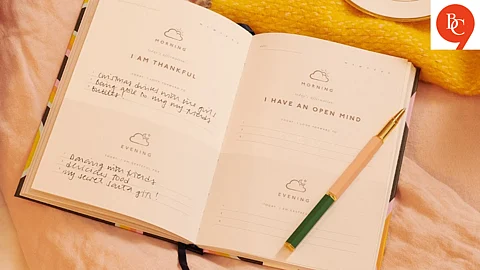

But here’s the secret: journaling doesn’t have to be perfect, deep, or time-consuming to work. Five minutes of focused, guided writing can genuinely shift your mood, soothe anxiety, and reconnect you with yourself. And no, you don’t need an aesthetic journal or fancy pens (though they’re nice).
These 5-minute journaling prompts are designed for real life — the messy, chaotic, healing-in-progress version of you. Do them in the morning, at night, or whenever your brain needs a breather.
1. “Right now, I feel… because…”
This one sounds simple, but it’s a powerful emotional dump. It helps name your emotions without judgment — which is the first step to understanding and releasing them.
Example:
“Right now, I feel frustrated because I keep comparing myself to others and it’s draining my confidence.”
Why it helps: It turns vague stress into something specific. You can’t solve what you can’t name.
2. “Three things I’m grateful for — no matter how small.”
Gratitude doesn’t mean ignoring your pain. It means anchoring yourself to what’s still good. Try naming everyday things that made your day 1% better.
Example:
The sound of rain while I worked
My friend who replied instantly when I vented
A warm shower that helped me reset
Why it helps: It trains your brain to spot the tiny wins even on hard days.
3. “What do I need right now — emotionally, physically, mentally?”
This prompt shifts your focus inward, especially when your default mode is overgiving or overthinking. It helps you pause and ask: what would truly help me feel supported today?
Example:
“I need space to not talk to anyone. I need a walk, deep breaths, and a playlist that doesn’t make me cry.”
Why it helps: It builds self-awareness and shows you that needs are not weaknesses.
4. “One thing I’m proud of — even if no one noticed.”
Validation doesn’t always have to come from others. This prompt lets you acknowledge your own progress, resilience, or kindness — no matter how “small” it seems.
Example:
“I’m proud I made my bed today even though I didn’t feel like existing. That’s effort.”
Why it helps: Celebrating micro-achievements boosts self-worth and motivation.
5. “If my inner critic had a mic, what would I say back?”
This one help unclog your head when negative self-talk spirals. Write what the critic says — then respond like your own hype person or compassionate friend.
Example:
Critic: “You’re so behind in life.”
You: “Maybe. But I’m trying. And I’ve survived a lot. That counts.”
Why it helps: It teaches emotional boundaries — and rewires the voice in your head to be kinder.
Bonus Mini Prompts (for When You're REALLY Tired):
Today, I survived by…
A song that matches my mood right now:
I wish someone would tell me…
A moment today that made me feel something:
I forgive myself for…
You don’t need a life plan, deep self-reflection, or poetic metaphors to feel better. You just need a few honest sentences. These prompts won’t fix everything — but they’ll help you slow down, listen in, and honour your inner world.
Because healing isn’t always loud. Sometimes, it’s just picking up a pen and giving yourself five quiet minutes.
